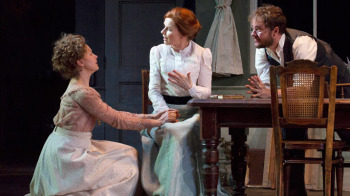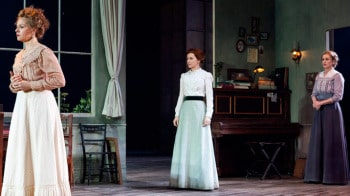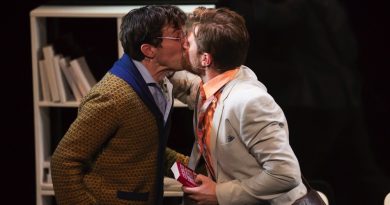Children of the Sun – Sydney Theatre Company
Children of the Sun was written in 1862 and yet, somehow, it manages to feel completely of this moment. The heart of it beats steadily, curiously, towards something that’s so relevant now: our unease in a changing world, our awareness of danger, that we’re not quite out of the woods yet – an impossibility to connect with the people around us, too, even when they’re right in front of our faces. Also the upper classes are ruining the lives of the lower ones, so it could be today or ten years ago or fifty or a hundred or two hundred or… well, at this point in time this kind of systemic, dangerous classism is timeless.
A heartwrenching comedy is the best kind of comedy, and Andrew Upton’s adaptation (originally staged by London’s National Theatre in 2013) is exactly that. We spend all our time in the rooms and grounds of one house: Protasov’s. He’s a middle-class chemist, the sort of eccentric man of science we’re all used to, except for the fact that it’s possible that his experiments are poisoning the poverty-stricken townspeople, not that you can tell him that. He’s too busy tinkering to talk.

He’s not alone in his castle of disconnect from the people. His wife Yelena feels neglected by her husband and buries herself in painting; Vegeen the painter is consumed, pretentiously, both by his art and by Yelena; Protasov’s protege Melaniya is actually obsessed with the scientist instead of scientist; and Boris, Protasov’s old friend, only spends his time trying to get Protasov’s sister Liza to notice/fall madly in love with him.
Liza is the only person who doesn’t settle for the mundanity of comfortable life. She’s not out there getting sick and protesting against the rich with the rest of the town, but she understands, unlike the rest of this ball of wealth, that their comfort is a house of cards and it can’t last forever. She’s wracked by episodes, depressive and anxious, and she is bleak, and she refuses to accept Boris’s interest, or anyone else’s frivolity.
Inside David Fleischer’s setpiece house on revolve, rooms are nooks and crannies for hiding; concealed rooms, where one goes to be alone. The walls are flats, transparent set-pieces, just to remind us of how flimsy and ridiculous the concept of privilege really is. This ominous house is nothing, really, just walls of wood. This ominous house means nothing, it is empty and empty are the lives within it.
Upton’s adaptation flows pleasantly to the modern ear; contemporary vernacular is spare but effective and never jarring – indeed, when a character explodes with a well-placed “fuck” or two it feels all the more cathartic and earned in its looseness. It’s a cunning production that breathes like a living organism; dynamic direction and staging (from Kip Williams) gives the plot a kinetic energy – like the march towards the ending is inevitable, like a fall from grace begins the minute the lights come up on stage.

The cast is a gift. Toby Truslove is a perfectly rumpled Protasov, absent-minded and impatient with feeling, and Hamish Michael is broad and pompous as the artist Vageen. However, this play is a play for these women who surround Protasov, and they make STC’s production sing with deep feeling, with light humour, with dread and longing and real, relatable humanity.
Of course these women are some of our finest actors. Valerie Bader and Justine Clarke bring a refreshing reasonable warmth to the stage as Nanny and Yelena. But there are two women who excel on this stage, a comedy-tragedy double feature (who both cross the line from one to the other to back again, despite having a home camp each on one distinct side of that coin).
Helen Thomson, who is never anything less than marvelous, is Melaniya, a lovely, endearingly funny woman with money and little else to offer, which she knows – she wants a husband, love, and belonging, and she will simper for it and love science for it and throw money at it if it means Protasov will pay her a lick of attention.
And then there’s Jacqueline McKenzie, despairing as Liza, waiting for the walls to come crashing down, refusing Boris’s love, slipping into dangerous moods and railing against her family and friends, waiting for someone – anyone – to wake up and realise that the bad smell in the house is a real portent of death, both metaphorically and literally.
While ever we have a blindly comfortable middle and upper class who are too preoccupied with themselves to notice that those who aren’t so lucky are hurting (losing their rights, falling below the poverty line, frequently sick and incarcerated and unable to catch a break), Gorky’s play will be relevant. It is perfect for our current political climate, beautifully staged, a classic made new.



